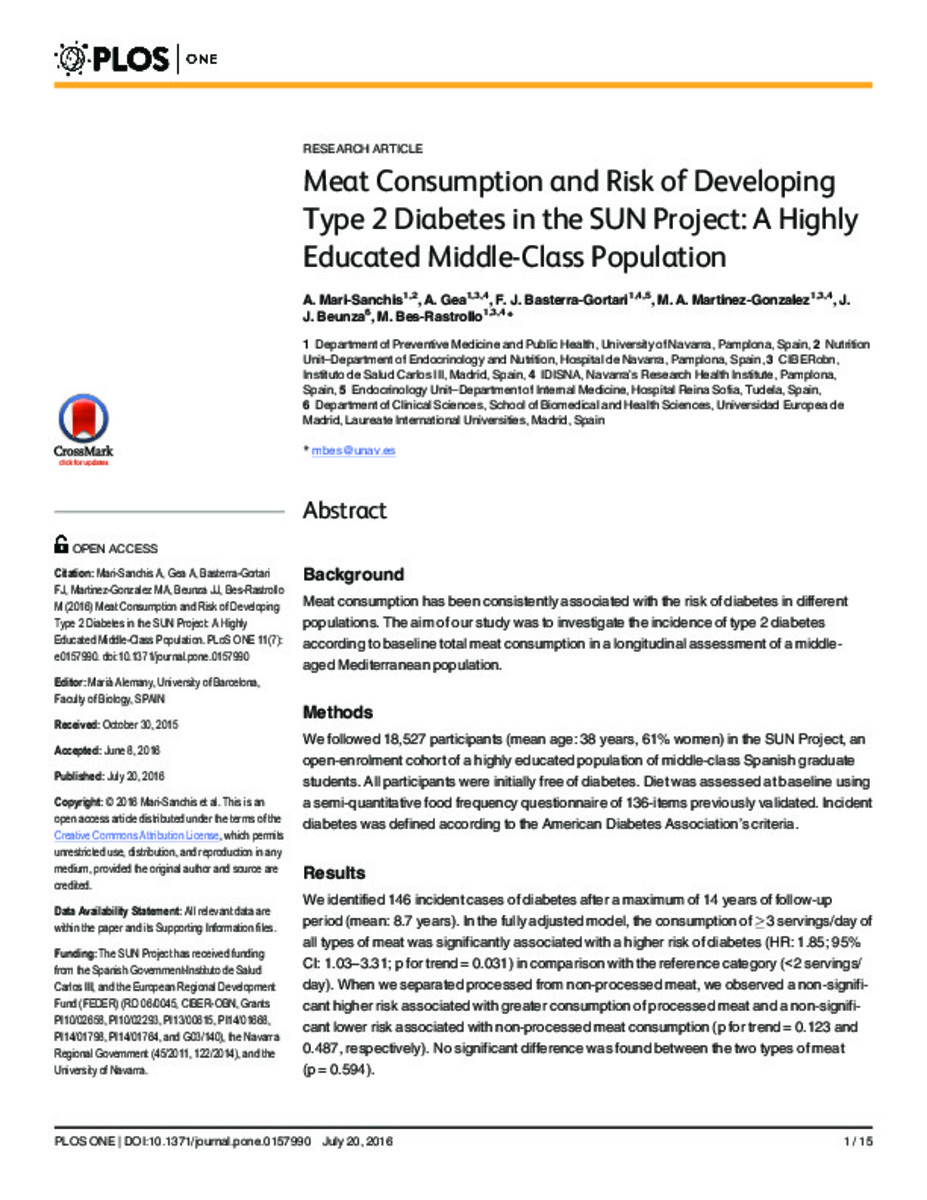Full metadata record
| DC Field | Value | Language |
|---|---|---|
| dc.creator | Mari-Sanchis, A. (Amelia) | - |
| dc.creator | Gea, A. (Alfredo) | - |
| dc.creator | Basterra-Gortari, F.J. (Francisco Javier) | - |
| dc.creator | Martinez-Gonzalez, M.A. (Miguel Ángel) | - |
| dc.creator | Beunza, J.J. (Juan José) | - |
| dc.creator | Bes-Rastrollo, M. (Maira) | - |
| dc.date.accessioned | 2017-03-30T09:32:19Z | - |
| dc.date.available | 2017-03-30T09:32:19Z | - |
| dc.date.issued | 2016 | - |
| dc.identifier.citation | Mari-Sanchis A, Gea A, Basterra-Gortari FJ, Martinez-Gonzalez MA, Beunza JJ, Bes-Rastrollo M. Meat Consumption and Risk of Developing Type 2 Diabetes in the SUN Project: A Highly Educated Middle-Class Population. PLoS ONE; 2016 Jul; 11(7): e0157990. | es_ES |
| dc.identifier.issn | 1932-6203 | - |
| dc.identifier.uri | https://hdl.handle.net/10171/43189 | - |
| dc.description.abstract | Background Meat consumption has been consistently associated with the risk of diabetes in different populations. The aim of our study was to investigate the incidence of type 2 diabetes according to baseline total meat consumption in a longitudinal assessment of a middle-aged Mediterranean population. Methods We followed 18,527 participants (mean age: 38 years, 61% women) in the SUN Project, an open-enrolment cohort of a highly educated population of middle-class Spanish graduate students. All participants were initially free of diabetes. Diet was assessed at baseline using a semi-quantitative food frequency questionnaire of 136-items previously validated. Incident diabetes was defined according to the American Diabetes Association’s criteria. Results We identified 146 incident cases of diabetes after a maximum of 14 years of follow-up period (mean: 8.7 years). In the fully adjusted model, the consumption of ≥3 servings/day of all types of meat was significantly associated with a higher risk of diabetes (HR: 1.85; 95% CI: 1.03–3.31; p for trend = 0.031) in comparison with the reference category (<2 servings/day). When we separated processed from non-processed meat, we observed a non-significant higher risk associated with greater consumption of processed meat and a non-significant lower risk associated with non-processed meat consumption (p for trend = 0.123 and 0.487, respectively). No significant difference was found between the two types of meat (p = 0.594). Conclusions Our results suggest that meat consumption, especially processed meat, was associated with a higher risk of developing diabetes in our young Mediterranean cohort. | es_ES |
| dc.language.iso | eng | es_ES |
| dc.publisher | Public Library of Science | es_ES |
| dc.rights | info:eu-repo/semantics/openAccess | es_ES |
| dc.subject | Materias Investigacion::Ciencias de la Salud::Salud pública | es_ES |
| dc.title | Meat Consumption and Risk of Developing Type 2 Diabetes in the SUN Project: A Highly Educated Middle-Class Population | es_ES |
| dc.type | info:eu-repo/semantics/article | es_ES |
| dc.description.note | © 2016 Mari-Sanchis et al. This is an open access article distributed under the terms of the Creative Commons Attribution License , which permits unrestricted use, distribution, and reproduction in any medium, provided the original author and source are credited. | es_ES |
| dc.identifier.doi | http://dx.doi.org/10.1371/journal.pone.0157990 | es_ES |
Files in This Item:
Statistics and impact
Items in Dadun are protected by copyright, with all rights reserved, unless otherwise indicated.






